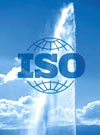 |
ISO 14001 as the fundamental document in the ISO 14000 family of standards |
 |
|---|
 The key notion in the ISO 14000 family of international standards is the Environmental Management System - EMS that is functioning at an enterprise (organization). Thus the basic document is the ISO 14001 "Specifications and Guide for use of environmental management systems". It differs from other documents through its requirements being easily audited. Its applicability to a concrete entity is supposed to be determined with a high degree of precision. The key notion in the ISO 14000 family of international standards is the Environmental Management System - EMS that is functioning at an enterprise (organization). Thus the basic document is the ISO 14001 "Specifications and Guide for use of environmental management systems". It differs from other documents through its requirements being easily audited. Its applicability to a concrete entity is supposed to be determined with a high degree of precision.
It is just due to it that conformity to the ISO 14001 standard is the subject of formal certification.
All other documents are looked upon as auxiliary ones. For example, the ISO 14004 is a detailed guide on setting up of the EMS, the ISO 14010 specifies the general principles of environmental auditing, a number of the ISO 14040 documents prescribe methods of "life cycle evaluation" to be used when determining ecological consequences caused by production processes. |
|---|
 |
In general terms the ISO 14001 standard helps to form a standing "management mechanism" that insures sustainable development of an enterprise (organization) and enhancement of environmental efficiency provided economic and social objectives are attained. |
|---|
The standard's provisions are readily applicable to small and medium business, as well as to big corporations.
As of the end of 2001 the EMS has been certified to satisfy the requirements of the ISO 14001 standard by nearly 37000 entities in 112 countries. |
|---|


 The key notion in the ISO 14000 family of international standards is the Environmental Management System - EMS that is functioning at an enterprise (organization). Thus the basic document is the ISO 14001 "Specifications and Guide for use of environmental management systems". It differs from other documents through its requirements being easily audited. Its applicability to a concrete entity is supposed to be determined with a high degree of precision.
The key notion in the ISO 14000 family of international standards is the Environmental Management System - EMS that is functioning at an enterprise (organization). Thus the basic document is the ISO 14001 "Specifications and Guide for use of environmental management systems". It differs from other documents through its requirements being easily audited. Its applicability to a concrete entity is supposed to be determined with a high degree of precision.